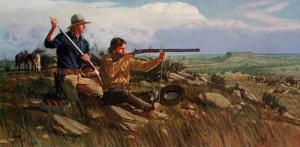| War and History Poetry posted March 26, 2016 | Chapters: |
...41 42 -43- 44... 
|
      |
A Crown Of Heroic Sonnets
A chapter in the book History and Myth
Buffalo - The Great Slaughter
by Treischel
|
Crown of Heroic Sonnets contest entry
 Recognized |
I felt the story of the Great Buffalo Slaughter should be told. There once were two large herds of buffalo that roamed across the Great Plains of the United States. The estimates range from 40 million to 60 million, at their peak. That is about 20-30 million in each group. It is said, that it would take as many as 2 days for the herd to thunder past. By the time the slaughter was complete, there somewhere between only 400 and 1200 bison left.
The Gap - I was referencing the Cumberland Gap that was discovered by Daniel Boone, allowing Western expansion across the Appalachian mountains.
In the 1840's there was a Yellow Fever epidemic throughout the southern United States, that killed thousands. The early symptoms were: a backache with a headache followed by a fever that lasted 5-6 days, after which the patient may recover. But if there was a relapse, they would die.
The Kentucky, long barrel rifle, was the main US made rifle in the early colonies. It helped win the revolution. The gun was a flintlock made by German immigrants around Philadelphia. It fired a 44 caliber ball that was accurate to about 200 yards, max. It could easily pull down large game.
Bowie Knife - a large hunting knife popularized by Jim Bowie.
Stokers - men who shoveled coal into steam engine boilers.
Fort Leavenworth, Kansas, was located in a strategic area for westward expansion, being along the major wagon trails, as well as on the Missouri River.
Bonanza - a rich source of income, usually attributed to mining.
Sharpes Rifle - the quintessential buffalo hunting rifle. It was a carbine, accurate to 300 yards (some claimed to 400 yards). It used a 55 caliber cartridge. Usually used with a tripod. Also known as Beecher's Bibles, when 500 were shipped to St. Louis in boxes marked as "Bibles."
After the civil war, the war with the Plains Indians, began in earnest. The US Army had been unsuccessful in beating the tribes in skirmishes. General Sherman determined that the best way to defeat them was to eliminate the buffalo upon which their entire society was based. He said that it was better and easier to kill a bufflo, than an Indian. In 1875, General Sheridan went before congress and asked that the elimination of the bison continue, as that had done more to tame the Indians than 40 years of battling them. That same year, President Grant pocket vetoed a bill to stop the extinction.
$6,500 in 1865 is about $100,000 today.
We're I come from, route rhymes with shoot.
For this poem I did you a few lines of feminine iambic meter.
This picture is from yahoo images.
Pays
one point
and 2 member cents. The Gap - I was referencing the Cumberland Gap that was discovered by Daniel Boone, allowing Western expansion across the Appalachian mountains.
In the 1840's there was a Yellow Fever epidemic throughout the southern United States, that killed thousands. The early symptoms were: a backache with a headache followed by a fever that lasted 5-6 days, after which the patient may recover. But if there was a relapse, they would die.
The Kentucky, long barrel rifle, was the main US made rifle in the early colonies. It helped win the revolution. The gun was a flintlock made by German immigrants around Philadelphia. It fired a 44 caliber ball that was accurate to about 200 yards, max. It could easily pull down large game.
Bowie Knife - a large hunting knife popularized by Jim Bowie.
Stokers - men who shoveled coal into steam engine boilers.
Fort Leavenworth, Kansas, was located in a strategic area for westward expansion, being along the major wagon trails, as well as on the Missouri River.
Bonanza - a rich source of income, usually attributed to mining.
Sharpes Rifle - the quintessential buffalo hunting rifle. It was a carbine, accurate to 300 yards (some claimed to 400 yards). It used a 55 caliber cartridge. Usually used with a tripod. Also known as Beecher's Bibles, when 500 were shipped to St. Louis in boxes marked as "Bibles."
After the civil war, the war with the Plains Indians, began in earnest. The US Army had been unsuccessful in beating the tribes in skirmishes. General Sherman determined that the best way to defeat them was to eliminate the buffalo upon which their entire society was based. He said that it was better and easier to kill a bufflo, than an Indian. In 1875, General Sheridan went before congress and asked that the elimination of the bison continue, as that had done more to tame the Indians than 40 years of battling them. That same year, President Grant pocket vetoed a bill to stop the extinction.
$6,500 in 1865 is about $100,000 today.
We're I come from, route rhymes with shoot.
For this poem I did you a few lines of feminine iambic meter.
This picture is from yahoo images.

You need to login or register to write reviews. It's quick! We only ask four questions to new members.
© Copyright 2024. Treischel All rights reserved.
Treischel has granted FanStory.com, its affiliates and its syndicates non-exclusive rights to display this work.


